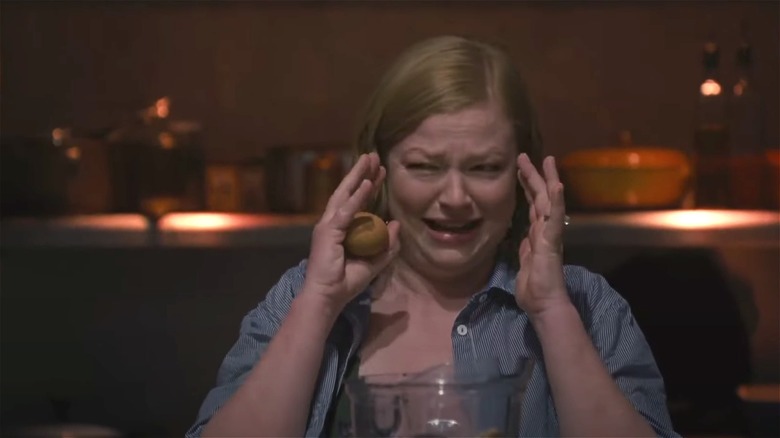Why Succession's Food Matters More Than You Think
HBO's "Succession" just wrapped up its fourth and final season with a finale that left viewers and foodies with a lot to chew on, and little appetite. The program, which focuses on the succession of power in the media-mogul Roy family, features meals that are conspicuously unappetizing. Food routinely calls attention to itself as a lens for understanding the underlying tensions of the characters' complex relationships.
Observers have pointed out a number of strange aspects of the meals and attitudes towards eating that "Succession" depicts. Large quantities of food are on offer, but very little of it seems to get eaten. Expensive, meticulously prepared foods (like Roy's wedding cake) function largely as symbols of control and prestige, rather than sources of pleasure or satisfaction. The lavish meals and elegant platters are there to remind you of the excess that the lucky few can afford but do not require – eating is for the plebes and is mostly beneath the Roys' sceptered sway.
The characters may not eat much, but they certainly talk about food — disparagingly. For instance, in one scene, Tom and Greg contemplate the horrors of life behind bars while munching on "prison food" at a diner. Tom describes Greg's omelet as "an endless salty gym mat" and warns that actual prison food will be much worse. Eating and being compared with vittles are synonymous with weakness. Food is easily seen as a trap of some kind, as is particularly apparent in episodes where characters fixate on the fear that they're being poisoned.
Food as a not-so-secret weapon
The ways in which food is wielded are a sign of the inner darkness that has seized control of the family. Food, something essential to life and inherently enjoyable, has become perverted into a means of control where no one benefits and no one is satisfied — a relentless symbol of just how wrong everything has gone.
All of this rains down on their heads in the final episode when the siblings determine to make a special smoothie for their brother who hopes to ascend to his father's position — a "meal fit for a king." What seems like silly sibling antics can never be just that for the Roys; their disgusting concoction evokes images of boarding school mischief, reminding us yet again of the echoes of privilege which permeate the fabric of their existence. But in a perfect moment of theatre, Roman pours it over Kendall's head, a gesture that parodies the anointing proper to the earthly kingship Ken was hoping to attain.
The joke is on Kendall, but also on his siblings. They have ignored the fact that there can be no winners in a game played their way. Instead of choosing to use and enjoy what they had, in their scheming and manipulating, they have turned good things into sludge and lost the power they hoped to gain in the equation. Food is a sign of the simple goodness they chose to give up: is it any wonder they all wind up hungry?

